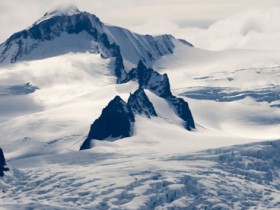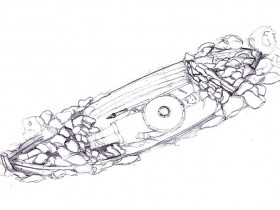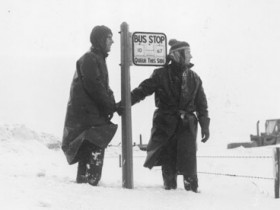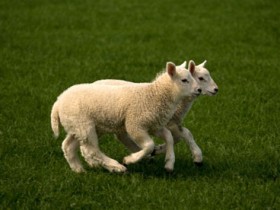News
Kalahari Desert could dust up Southern Ocean
Environmental Research Web, 26 April 2012
environmentalresearchweb.org/cws/article/news/49404
Take a deep breath. If you live in the northern hemisphere then you will have inhaled a fair amount of dust. If you live in the southern hemisphere that breath was relatively dust free. However, new research indicates that the southern hemisphere is set to become dustier, as the South-African Kalahari Desert starts to erode. Ultimately, this additional airborne sand may breathe new life into ocean ecosystems.
READ ARTICLE AT Environmental Research Web
Weatherwatch: Wind delayed first woman’s flight across channel

The Guardian, 15 April 2012
www.guardian.co.uk/news/2012/apr/15/weatherwatch-aviation-history-flight
Kate Ravilious looks at the adventurous life of Harriet Quimby
READ ARTICLE AT The Guardian
Weatherwatch: What is behind this summer in March?

The Guardian, 30 March 2012
www.guardian.co.uk/news/2012/mar/30/weatherwatch-summer-march-temperatures
Kate Ravilious says a strong ridge of high pressure is the cause of high temperatures
READ ARTICLE AT The Guardian
Weatherwatch: March sometimes has a sting in its tail

The Guardian, 18 March 2012
www.guardian.co.uk/news/2012/mar/18/weatherwatch-masts-winter-transmitters
Kate Ravilious looks at a TV mast which withstood the worst of British weather
READ ARTICLE AT The Guardian
Mystery booms: The source of a worldwide sonic enigma

New Scientist, 23 February 2012
www.newscientist.com/article/mg21328522.300-mystery-booms-the-source-of-a-worldwide-sonic-enigma.html
Every so often, a loud booming noise is heard from over the horizon without any obvious explanation. What on Earth could the culprit be?
READ ARTICLE AT New Scientist
Weatherwatch: Dirty glaciers melt faster than clean glaciers

The Guardian, 19 February 2012
www.guardian.co.uk/news/2012/feb/19/weatherwatch-glaciers-environment-pollution
Kate Ravilious focuses on the environmental findings of concentrated dirt
READ ARTICLE AT The Guardian
“No time to waste” on transition to green energy
Environmental Research Web, 16 February 2012
environmentalresearchweb.org/cws/article/news/48649
If the entire world adopted ‘green’ forms of energy tomorrow, how long would it take for global temperatures to stabilize? The answer is a good 50 years: even if we “pull out all of the stops” there is little we can do to diminish the impact of climate change during the first half of this century. But choosing to adopt the right technologies now should stabilize the climate by the second half of the century, according to a new study.
READ ARTICLE AT Environmental Research Web
Top discoveries of 2011: Viking Boat Burial – Ardnamurchan, Scotland

Archaeology Magazine, 31 January 2012
www.archaeology.org/1201/features/topten_scotland.html
A spectacular Viking boat burial was uncovered this year on the coast of Ardnamurchan, a remote region of western Scotland, the first such burial to be found on the British mainland. The Viking, who is thought to have perished over 1,000 years ago, was most likely a high-ranking warrior.
READ ARTICLE AT Archaeology Magazine
Are China’s greens set to turn to brown?
Environmental Research Web, 30 January 2012
environmentalresearchweb.org/cws/article/news/48483
China has become greener in recent decades. Since the 1980s trees, shrubs and grasses have been flourishing, thanks to warmer temperatures, a longer growing season and plenty of rain. But now research shows that this beneficial trend appears to be tailing off, with drought stress predominant in some areas. If the warmer, drier trend continues then China’s lush green appearance may start turning to parched brown.
READ ARTICLE AT Environmental Research Web
Weatherwatch: Winters in northern hemisphere set to get colder

The Guardian, 22 January 2012
www.guardian.co.uk/news/2012/jan/22/weatherwatch-global-warming-climate-change
Kate Ravilious examines recent findings on global temperature changes
READ ARTICLE AT The Guardian
Global warming set to bring colder, snowier winters
Environmental Research Web, 13 January 2012
environmentalresearchweb.org/cws/article/news/48293
The world is getting warmer, which should mean warmer winters – right? Wrong – a new study shows that global warming produces colder winters and heavier dumps of snow for large swathes of the northern hemisphere.
READ ARTICLE AT Environmental Research Web
Weatherwatch: The Föhn effect and winter warmth in Wales

The Gaurdian, 4 January 2012
www.guardian.co.uk/news/2012/jan/04/weatherwatch-wales-fohn-warm
Fancy basking in temperatures of 17C or so in January? Winter breaks to the Canary Isles are one way of achieving this, but relocating to Britain’s “hot-spots” could also give you a few more balmy winter days.
READ ARTICLE AT The Gaurdian







